关于时间前的介词用法
时间前面的介词用法

时间名词前所用介词的速记歌年月周前要用in,日子前面却不行。
遇到几号要用on,上午下午又是in。
要说某日上下午,用on换in才能行。
午夜黄昏须用at,黎明用它也不错。
at也用在明分前,说“差”可要用上to,说“过”只可使用past,多说多练牢牢记,莫让岁月空蹉跎。
下面就时间概念的介词用法做一简要介绍和比较。
1.at表示时间概念的某一个点。
(在某时刻、时间、阶段等)。
at 1:00(dawn,midnight,noon)在一点钟(黎明、午夜、中午)These are our chief tasks at the present stage.这些就是我们现阶段的主要任务。
2.on1)表示具体日期。
They arrived in shanghai on May 25.他们在五月二十五日到达上海。
注:(1)关于"在周末"的几种表示法:at(on)the weekend 在周末---特指at(on)weekends 在周末---泛指over the weekend 在整个周末during the weekend 在周末期间(2)在圣诞节,应说"at Christmas?而不说"on Christmas?2)在(刚……)的时候。
On reaching the city he called up his parents.一到城里他就给父母打了一个电话。
3.in1)表示"时段"、"时期",在多数情况下可以和during互换,前者强调对比,后者强调持续。
in(during)1988(December,the 20th century)在一九八八年(十二月、二十世纪)I returned to Beijing in the middle of June.我是六月中回北京的。
但如果表示"在某项活动的期间",则只能用during。
介 词 的 种 类 及 用 法(二):表示时间的介词(in、within;before、after;from、since)
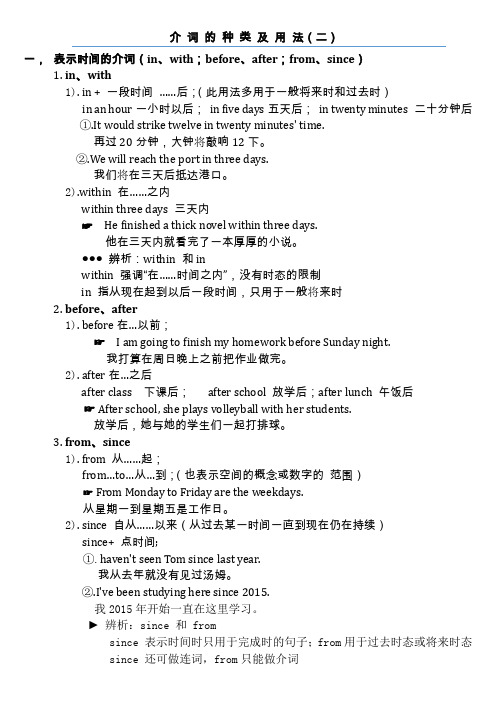
介词的种类及用法(二)一,表示时间的介词(in、with;before、after;from、since)1. in、with1). in + 一段时间……后;(此用法多用于一般将来时和过去时)in an hour一小时以后;in five days五天后;in twenty minutes 二十分钟后①.It would strike twelve in twenty minutes' time.再过20分钟,大钟将敲响12下。
②.We will reach the port in three days.我们将在三天后抵达港口。
2).within 在……之内within three days 三天内☞He finished a thick novel within three days.他在三天内就看完了一本厚厚的小说。
●●●辨析:within 和inwithin 强调“在……时间之内”,没有时态的限制in 指从现在起到以后一段时间,只用于一般将来时2. before、after1). before在…以前;☞I am going to finish my homework before Sunday night.我打算在周日晚上之前把作业做完。
2). after在…之后after class 下课后;after school 放学后;after lunch 午饭后☞After school, she plays volleyball with her students.放学后,她与她的学生们一起打排球。
3. from、since1). from 从……起;from…to…从…到;(也表示空间的概念或数字的范围)☞From Monday to Friday are the weekdays.从星期一到星期五是工作日。
2). since 自从……以来(从过去某一时间一直到现在仍在持续)since+ 点时间;①.haven't seen Tom since last year.我从去年就没有见过汤姆。
时间前面介词用法

一分耕耘一分收获 时间名词前所用介词的速记歌 年月周前要用in,日子前面却不行。 遇到几号要用on,上午下午又是in。 要说某日上下午,用on换in才能行。 午夜黄昏须用at,黎明用它也不错。 at也用在明分前,说“差”可要用上to, 说“过”只可使用past,多说多练牢牢记, 莫让岁月空蹉跎。
下面就时间概念的介词用法做一简要介绍和比较。 1.at表示时间概念的某一个点。(在某时刻、时间、阶段等)。 at 1:00(dawn,midnight,noon)在一点钟(黎明、午夜、中午) these are our chief tasks at the present stage.这些就是我们现阶段的主要任务。 2.on 1)表示具体日期。 they arrived in shanghai on may 25.他们在五月二十五日到达上海。 注:(1)关于"在周末"的几种表示法: at(on)the weekend在周末---特指 at(on)weekends在周末---泛指 over the weekend在整个周末 during the weekend在周末期间 (2)在圣诞节,应说"at Christmas而不说"on Christmas 2)在(刚……)的时候。 on reaching the city he called up his parents.一到城里他就给父母打了一个电话。 3.in 一分耕耘一分收获 1)表示"时段"、"时期",在多数情况下可以和dur- ing互换,前者强调对比,后者强调持续。 in(during)1988(December,the 20th century)在一九八八年(十二月、二十世纪) i returned to Beijing in the middle of June.我是六月中回北京的。 但如果表示"在某项活动的期间",则只能用during。 during my military service(the trip)在我服役期间(在旅行期间) 2)表示以说话时间为基点的"(若干时间)以后",常用作将来时态谓语的时间状语。如这时要表示"(若干时间)内",常用within。比较: the meeting will end in 30minutes.(三十分钟后)会议三十分钟后结束。 can you finish it within 30minutes?(三十分钟内)你能在三十分钟之内完成这件事吗? 但在过去时态中,in可用于表"在若干时间以内",这时不要误用during。 the job was done during a week.(wrong) the job was done in a week.(right)这工作在一星期内就完成了。 4.after表示"在(某具体时间)以后",注意不要和in的2)意混淆。 after supper(8o’clock,the war)晚饭(八点、战)后 比较:he will be back in two hours.他将在两个小时以后回来。 he returned tohis hometown after the war.战后他回到了故乡。 5.for表示"(动作延续)若干时间",有时可省略。 i stayed in london(for)two days on my way to new york.在去纽约的途中,我在伦敦呆了两天。 6.since表示"自(某具体时间)以来",常用作完成时态谓语的时间状语。 since liberation(1980)自从解放(1980年)以来 they have been close friends since childhood.他们从小就是好朋友。 注: 一分耕耘一分收获 (1)since the war是指"自从战争结束以来",若指"自从战争开始以来",须说"since the beginning of the war"。 (2)不要将since与after混淆。 比较:he has worked here since 1965.(指一段时间,强调时间段)自从1965年以来,他一直在这儿工作。 he began to work here after 1965.(指一点时间,强调时间点)从1965年以后,他开始在这儿工作。 7.by表示"到……的时候",其谓语时态的用法:动作动词常用完成时态;状态动词(be)常用一般时态。 比较: by noon,everybody had(will have)arrived there. by noon,everybody were(will be)there. 到中午的时候,大家都(将)到那儿了。 以上探讨了介词表示时间概念时的用法和比较,上述介词除表示时间概念外还有其他的用法,英语学习者必须掌握其各种用法,才能灵活运用,提高自己的语言能力。
介词in,on,at时间的用法总结
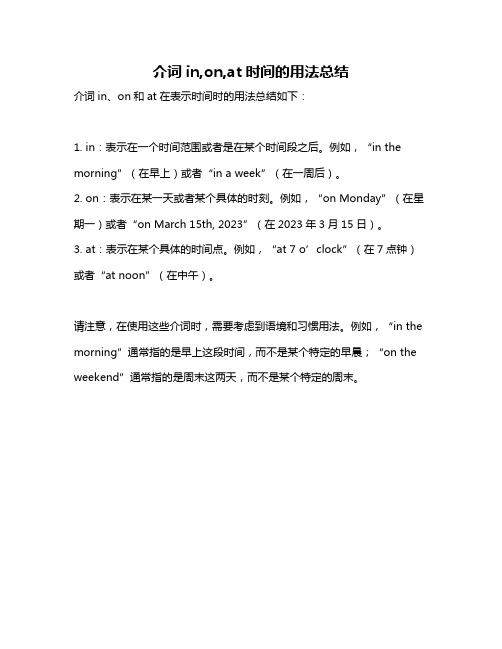
介词in,on,at时间的用法总结
介词in、on和at在表示时间时的用法总结如下:
1. in:表示在一个时间范围或者是在某个时间段之后。
例如,“in the morning”(在早上)或者“in a week”(在一周后)。
2. on:表示在某一天或者某个具体的时刻。
例如,“on Monday”(在星期一)或者“on March 15th, 2023”(在2023年3月15日)。
3. at:表示在某个具体的时间点。
例如,“at 7 o’clock”(在7点钟)或者“at noon”(在中午)。
请注意,在使用这些介词时,需要考虑到语境和习惯用法。
例如,“in the morning”通常指的是早上这段时间,而不是某个特定的早晨;“on the weekend”通常指的是周末这两天,而不是某个特定的周末。
英语中时间名词前介词的用法
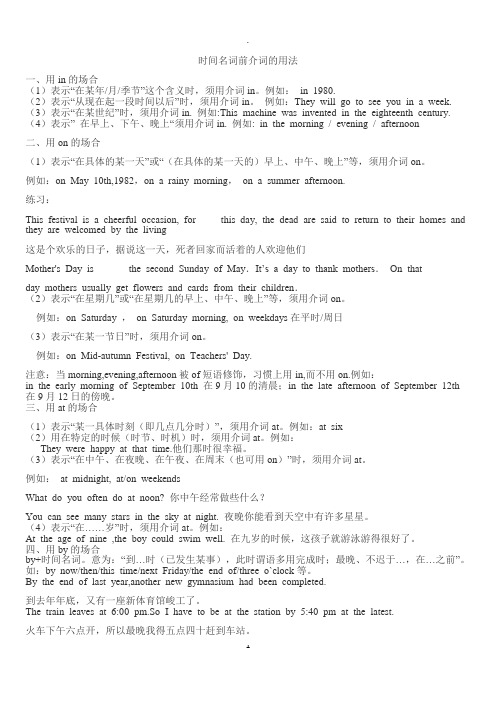
时间名词前介词的用法一、用in的场合(1)表示“在某年/月/季节”这个含义时,须用介词in。
例如:in 1980.(2)表示“从现在起一段时间以后”时,须用介词in。
例如:They will go to see you in a week. (3)表示“在某世纪”时,须用介词in. 例如:This machine was invented in the eighteenth century. (4)表示” 在早上、下午、晚上“须用介词in. 例如: in the morning / evening / afternoon二、用on的场合(1)表示“在具体的某一天”或“(在具体的某一天的)早上、中午、晚上”等,须用介词on。
例如:on May 10th,1982,on a rainy morning,on a summer afternoon.练习:This festival is a cheerful occasion, for ____this day, the dead are said to return to their homes and they are welcomed by the living这是个欢乐的日子,据说这一天,死者回家而活着的人欢迎他们Mother's Day is ______the second Sunday of May.It’s a day to thank mothers.On thatday mothers usually get flowers and cards from their children.(2)表示“在星期几”或“在星期几的早上、中午、晚上”等,须用介词on。
例如:on Saturday ,on Saturday morning, on weekdays在平时/周日(3)表示“在某一节日”时,须用介词on。
例如:on Mid-autumn Festival, on Teachers' Day.注意:当morning,evening,afternoon被of短语修饰,习惯上用in,而不用on.例如:in the early morning of September 10th 在9月10的清晨;in the late afternoon of September 12th 在9月12日的傍晚。
介词在时间的用法归纳
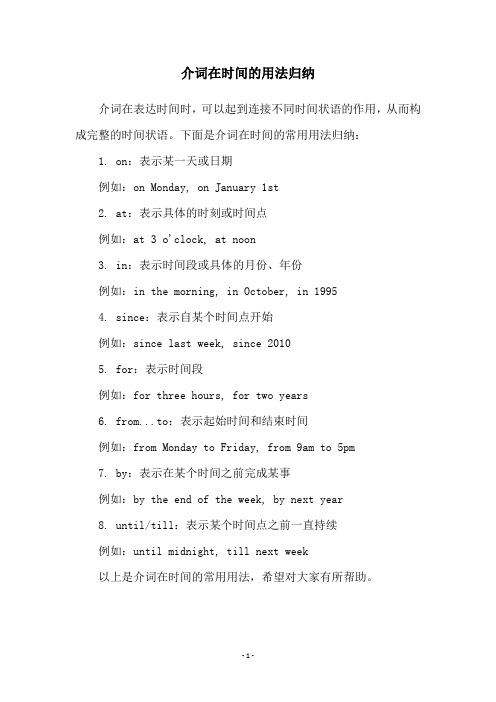
介词在时间的用法归纳
介词在表达时间时,可以起到连接不同时间状语的作用,从而构成完整的时间状语。
下面是介词在时间的常用用法归纳:
1. on:表示某一天或日期
例如:on Monday, on January 1st
2. at:表示具体的时刻或时间点
例如:at 3 o'clock, at noon
3. in:表示时间段或具体的月份、年份
例如:in the morning, in October, in 1995
4. since:表示自某个时间点开始
例如:since last week, since 2010
5. for:表示时间段
例如:for three hours, for two years
6. from...to:表示起始时间和结束时间
例如:from Monday to Friday, from 9am to 5pm
7. by:表示在某个时间之前完成某事
例如:by the end of the week, by next year
8. until/till:表示某个时间点之前一直持续
例如:until midnight, till next week
以上是介词在时间的常用用法,希望对大家有所帮助。
- 1 -。
(完整版)英语中时间名词前介词的用法

时间名词前介词的用法一、用in的场合(1)表示“在某年/月/季节”这个含义时,须用介词in。
例如:in 1980.(2)表示“从现在起一段时间以后”时,须用介词in。
例如:They will go to see you in a week. (3)表示“在某世纪”时,须用介词in. 例如:This machine was invented in the eighteenth century. (4)表示” 在早上、下午、晚上“须用介词in. 例如: in the morning / evening / afternoon二、用on的场合(1)表示“在具体的某一天”或“(在具体的某一天的)早上、中午、晚上”等,须用介词on。
例如:on May 10th,1982,on a rainy morning,on a summer afternoon.练习:This festival is a cheerful occasion, for ____this day, the dead are said to return to their homes and they are welcomed by the living这是个欢乐的日子,据说这一天,死者回家而活着的人欢迎他们Mother's Day is ______the second Sunday of May.It’s a day to thank mothers.On thatday mothers usually get flowers and cards from their children.(2)表示“在星期几”或“在星期几的早上、中午、晚上”等,须用介词on。
例如:on Saturday ,on Saturday morning, on weekdays在平时/周日(3)表示“在某一节日”时,须用介词on。
例如:on Mid-autumn Festival, on Teachers' Day.注意:当morning,evening,afternoon被of短语修饰,习惯上用in,而不用on.例如:in the early morning of September 10th 在9月10的清晨;in the late afternoon of September 12th 在9月12日的傍晚。
at、in、on在时间地点上的用法
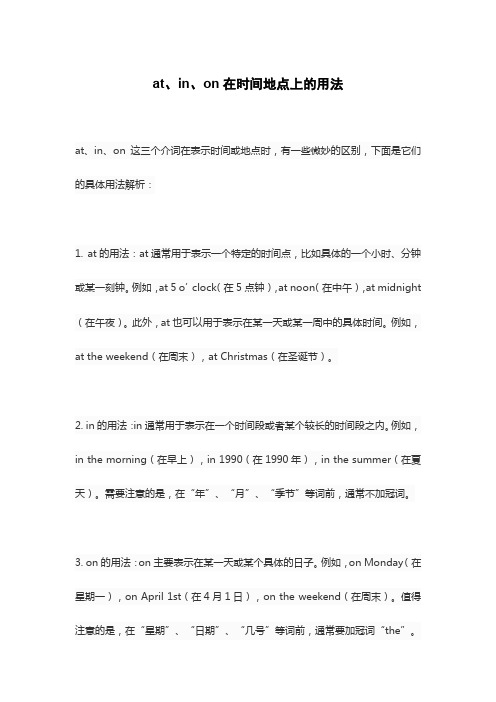
at、in、on在时间地点上的用法at、in、on这三个介词在表示时间或地点时,有一些微妙的区别,下面是它们的具体用法解析:1. at的用法:at通常用于表示一个特定的时间点,比如具体的一个小时、分钟或某一刻钟。
例如,at 5 o’clock(在5点钟),at noon(在中午),at midnight (在午夜)。
此外,at也可以用于表示在某一天或某一周中的具体时间。
例如,at the weekend(在周末),at Christmas(在圣诞节)。
2. in的用法:in通常用于表示在一个时间段或者某个较长的时间段之内。
例如,in the morning(在早上),in 1990(在1990年),in the summer(在夏天)。
需要注意的是,在“年”、“月”、“季节”等词前,通常不加冠词。
3. on的用法:on主要表示在某一天或某个具体的日子。
例如,on Monday(在星期一),on April 1st(在4月1日),on the weekend(在周末)。
值得注意的是,在“星期”、“日期”、“几号”等词前,通常要加冠词“the”。
关于地点方面,这三个介词的区别主要如下:1. at表示在某一点,或者在小的、具体的范围内。
例如,at the bus stop(在公交车站),at the crossroads(在十字路口)。
2. in表示在一个较大的、封闭的空间或者范围之内。
例如,in the classroom (在教室里),in the office building(在办公楼里)。
3. on表示在某个物体的表面或者上方。
例如,on the table(在桌子上),on the floor(在地上)。
以上是at、in、on三个介词的基本用法解析,它们的具体用法可能会因语境的不同而有所变化。
在使用时,要根据具体的语境选择合适的介词。
- 1、下载文档前请自行甄别文档内容的完整性,平台不提供额外的编辑、内容补充、找答案等附加服务。
- 2、"仅部分预览"的文档,不可在线预览部分如存在完整性等问题,可反馈申请退款(可完整预览的文档不适用该条件!)。
- 3、如文档侵犯您的权益,请联系客服反馈,我们会尽快为您处理(人工客服工作时间:9:00-18:30)。
关于时间前的介词用法
1、介词in用法:
2、介词at的用法:
3、after 表示在什么时间之后。
4、其反义词是before 或ago 表示在什么时间之前
5、介词on的用法:
小学英语介词at,in与on在时间方面的用法
at表示时间的一点;in表示一个时期;on表示特殊日子。
如:He goes to school at seven o’clock in the morning. 他早晨七点上学。
Can you finish the work in two days. 你能在两天内完成这个工作吗?
Linda was born on the second of May. 琳达五月二日出生。
1>. at后常接几点几分,天明,中午,日出,日落,开始等。
如:at five o’clock (五点),
at down (黎明),
at daybreak (天亮),
at sunrise (日出),
at noon (中午),
at sunset (日落),
at midnight (半夜),
at the beginning of the month (月初),
at that time (那时)
at that moment (那会儿),
at this time of day (在一天的这个时候)。
2>. in后常接年,月,日期,上午,下午,晚上,白天,季节,世纪等。
如:in 2006(2006年),
in May,2004 (2004年五月),
in the morning (早晨/上午),
in the afternoon (下午),
in the evening (晚上),
in the night (夜晚),
in the daytime (白天),
in the 21st century (21世纪),
in three days (weeks/month)三天(周/个月),
in a week (一周),
in spring (春季)。
3>. on后常接某日,星期几,某日或某周日的朝夕,节日等。
如:on Sunday (星期日),
on a warm morning in April (四月的一个温暖的上午),
on a December night (12月的一个夜晚),
on that afternoon (那天下午),
on the following night (下一个晚上),
on Christmas afternoon (圣诞节下午),
on October 1,1949 (1949年10月1日),
on New Year’s Day (新年),
on New Year’s Eve (除夕),
on the morning of the 15th (15日的早上)等。
